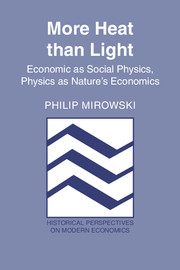Book contents
- Frontmatter
- Contents
- Figures
- Acknowledgments
- 1 The fearful spheres of Pascal and Parmenides
- 2 Everything an economist needs to know about physics but was probably afraid to ask: The history of the energy concept
- 3 Body, motion, and value
- 4 Science and substance theories of value in political economy to 1870
- 5 Neoclassical economic theory: An irresistable field of force meets an immovable object
- 6 The corruption of the field metaphor, and the retrogression to substance theories of value: Neoclassical production theory
- 7 The ironies of physics envy
- 8 Universal history is the story of different intonations given to a handful of metaphors
- Appendix: The mathematics of the Lagrangian and Hamiltonian formalisms
- Notes
- Bibliography
- Index
4 - Science and substance theories of value in political economy to 1870
Published online by Cambridge University Press: 01 June 2011
- Frontmatter
- Contents
- Figures
- Acknowledgments
- 1 The fearful spheres of Pascal and Parmenides
- 2 Everything an economist needs to know about physics but was probably afraid to ask: The history of the energy concept
- 3 Body, motion, and value
- 4 Science and substance theories of value in political economy to 1870
- 5 Neoclassical economic theory: An irresistable field of force meets an immovable object
- 6 The corruption of the field metaphor, and the retrogression to substance theories of value: Neoclassical production theory
- 7 The ironies of physics envy
- 8 Universal history is the story of different intonations given to a handful of metaphors
- Appendix: The mathematics of the Lagrangian and Hamiltonian formalisms
- Notes
- Bibliography
- Index
Summary
The economic laws aimed at and formulated under the guidance of this preconception are laws of what takes place “naturally” or “normally,” and it is of the essence of things so conceived that in the natural or normal course there is no wasted or misdirected effort … the resulting economic theory is formulated as an analysis of the “natural” course of the life of the community, the ultimate theoretical postulate of which might, not unfairly, be stated as some sort of law of the conservation of economic energy … there prevails an equivalence of expenditure and returns, an equilibrium of flux and reflux, which is not broken over in the normal course of things. So it is, by implication, assumed that the product which results from any given industrial process or operation is, in some sense or unspecified aspect, the equivalent of the expenditure of forces, or the effort, or what not, that has gone into the process out of which the product emerges
[Veblen 1969, pp. 280–1].But, since a strict uniformity is nowhere to be observed at first hand in the phenomena with which the investigator is occupied, it has to be found by a laborious interpretation of the phenomena and a diligent abstraction and allowance for disturbing circumstances, whatever may be the meaning of a disturbing circumstance where causal continuity is denied. In this work of interpretation and expurgation the investigator proceeds on a conviction of the orderliness of natural sequence
[Veblen 1969, p. 162].- Type
- Chapter
- Information
- More Heat than LightEconomics as Social Physics, Physics as Nature's Economics, pp. 139 - 192Publisher: Cambridge University PressPrint publication year: 1989



